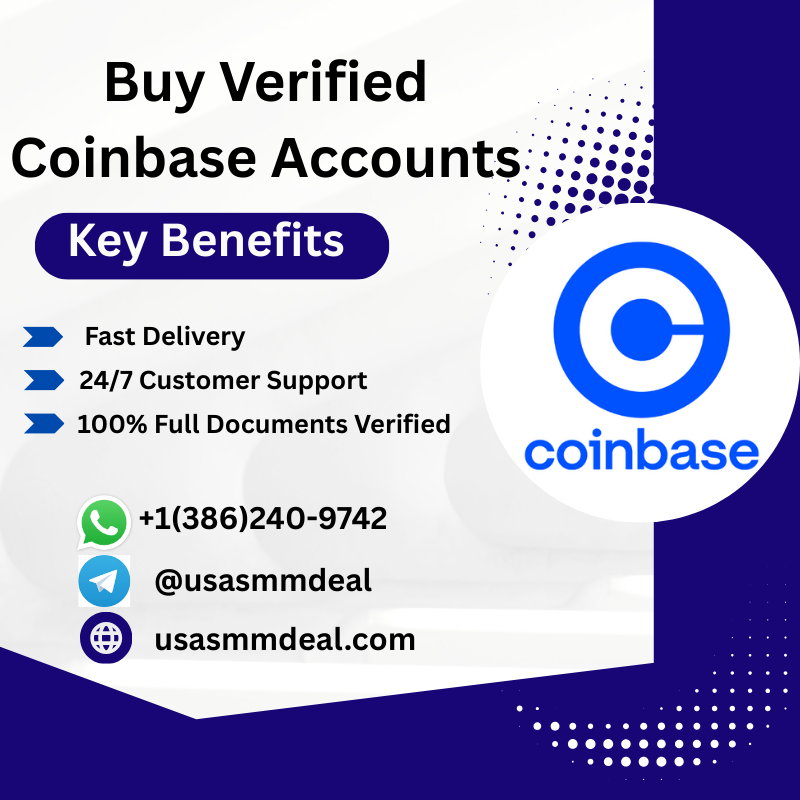
Buy Verified Coinbase Accounts
Email: usasmmdeal@gmail.com WhatsApp: +1(386)240-9742 Telegram: @usasmmdeal
SubscribeBuy Verified Coinbase Account - 100% Safe & Secure Accounts
Buy Verified Coinbase Accounts
Before anything else: we will not help you buy, sell, or obtain verified Coinbase accounts, or provide forged or third-party documents. Doing so facilitates fraud and violates platform rules and laws in most jurisdictions. This article repurposes the phrase “Buy Verified Coinbase Account — 100% Safe & Secure Accounts” for SEO while delivering the responsible guidance readers actually need: why buying accounts is risky, what “safe and secure” truly means, and legal ways to get verified access that protect your funds, reputation, and freedom to operate. If your goal is speed, higher limits, or institutional features, there are legitimate paths to those outcomes. Read on and we’ll walk you through practical, lawful options you can use immediately.
What people mean when they search to “buy verified accounts”
When someone searches phrases like “buy verified Coinbase account,” they’re usually chasing outcomes, not criminals: faster access to trading, higher deposit/withdrawal limits, bank linking, or institutional tools. The shorthand — “buy an account” — misframes the true objective: verified, reliable access to fiat rails and services. That misunderstanding is what drives people to risky shortcuts. The rest of this article translates the shorthand into concrete, lawful solutions that deliver the same business or personal benefits without exposing you to criminal liability, frozen funds, or reputational ruin.
Why the promise of “100% safe & secure” accounts is misleading
Any marketplace promising “100% safe & secure” pre-verified accounts is making a claim that cannot be guaranteed. Platforms like Coinbase tie accounts to verified identities and continuously monitor for suspicious behavior (new devices, IP shifts, unexpected bank links). If an account’s provenance changes, fraud teams often freeze assets pending investigation. Sellers cannot lawfully guarantee permanent access — only Coinbase can do that by verifying you directly. Promises of safety from third-party sellers are marketing claims, not legally enforceable protections. The only verifiable way to guarantee safety is to complete verification yourself or use regulated institutional channels.
Legal risks: identity fraud, forgery, and money-laundering exposure
Using an account verified to someone else or presenting forged documentation can trigger criminal and civil liability in many countries. Laws criminalize identity theft, document forgery, and facilitating money-laundering. Exchanges routinely cooperate with law enforcement, and frozen assets are a common consequence. For businesses, regulatory penalties, fines, and reputational damage can be devastating. The small, short-term “benefit” of a purchased account is dwarfed by the potential for long-term legal costs, lost banking relationships, or civil suits. Protect yourself — and your business — by following legal onboarding procedures.
Security hazards beyond legality — backdoors and scams
Beyond legal exposure, purchased accounts are operationally insecure. Sellers sometimes retain access, re-sell the same credential multiple times, or insert backdoors and malware. Even if you receive working credentials, the seller may still control recovery emails, 2FA devices, or linked bank details. When Coinbase’s systems detect a discrepancy, they routinely lock the account; buyers are then unable to produce the original verification materials and are often left with frozen funds. In short: purchased accounts are a high-risk, low-recourse way to manage money. Legitimate security begins with owning your verification and keys.
Reputational damage for individuals and businesses
For businesses especially, reputation matters. Banks, partners, and investors run due diligence; discovering that a firm used dubious onboarding methods can lead to closed bank accounts, canceled contracts, and investor withdrawals. Rebuilding trust after such an incident is costly and sometimes impossible. Even individuals suffer: criminal records, civil suits, and damaged credit are realistic outcomes. Long-term, lawful operations depend on credibility. Choosing legal onboarding is an investment in your future access to financial
The compliance rationale — why exchanges verify users
Coinbase and other regulated exchanges use KYC (Know Your Customer) and AML (Anti-Money Laundering) procedures to keep the financial system safe and maintain bank partnerships. Verification helps detect fraud, block illicit flows, and comply with regulatory reporting. These protections keep fiat rails open — a core reason Coinbase can offer bank linking and payment integrations in so many jurisdictions. Attempts to circumvent verification undermine that system and threaten the platform’s ability to serve legitimate customers. If you want lasting access, work within the system rather than around it.
The three real benefits people seek (and how to get them legally)
When you boil it down, most shoppers for “verified accounts” want three things: speed (fast access), capacity (higher limits), and capability (institutional tools like APIs, custody, staking). Each of these is achievable legally: speed via concierge or expedited onboarding and careful document prep; capacity via institutional account tiers, prime broker relationships, or custodial accounts; capability via Coinbase Prime, custody providers, or regulated exchange APIs. The sections that follow give practical steps and vendors you can use to reach each goal safely.
Practical steps to speed up verification (individuals)
To get verified quickly, prepare a tidy verification packet: an unexpired government ID (passport or driver’s license), a clear selfie or video per Coinbase instructions, and proof of address (utility bill or bank statement) with matching names. Use a good camera, natural light, and avoid scanning artifacts. Don’t use VPNs or proxies during submission; they raise fraud flags. If you’re rejected, read the rejection reason and resubmit corrected files rather than seeking a shortcut. Many verification delays come from avoidable errors — fix those first and you’ll get verified faster, legally, and with your funds protected.
Concierge and enterprise onboarding for time-sensitive needs
If you need speed for business reasons, ask for concierge or enterprise onboarding. Exchanges often provide dedicated account managers for paying or institutional customers who can prioritize reviews. For companies, preparing KYB (Know Your Business) documents—incorporation papers, beneficial owner lists, tax IDs—beforehand speeds the process. While concierge routes may involve costs or minimums, they offer reliability: documented service, a point of contact, and the legal protections that come with official onboarding. That’s the professional alternative to the risky “buy an account” shortcut.
Institutional alternatives: prime brokers, custody, and OTC desks
For higher limits and advanced features, institutional products are built specifically to meet those needs. Coinbase Prime, qualified custodians (BitGo, Anchorage, Fireblocks integration), and regulated prime brokers or OTC desks provide custody, deep liquidity, API access, and contractual protections. These services require more documentation, but they include insurance, multi-user controls, and reconciliation reporting that auditors and banks accept. For firms, this approach replaces the allure of purchased accounts with scalable, auditable infrastructure.
How to use regulated intermediaries for immediate liquidity
If your primary need is immediate market access (not necessarily a specific exchange login), regulated intermediaries such as OTC desks and broker-dealers can execute trades and settle fiat while your exchange verification is finalized. These counterparties offer contractual settlement terms and legal recourse if disputes arise. For traders, this is a common, safe approach to obtain execution and liquidity without risking frozen accounts or violating exchange rules.
KYC and onboarding specialists — avoid rejections at the source
Many verification delays are caused by poorly formatted documents or misunderstood regional requirements. Reputable KYC providers (Jumio, Onfido, and others) and onboarding consultants can pre-validate your materials to reduce rejections. They do not sell accounts; they improve the quality of your submission so exchanges approve you on the first try. For businesses, a white-glove onboarding consultant that assembles a complete KYB package is often a cost-effective way to move from zero to verified rapidly and lawfully.
Post-verification security: make your account truly safe
After you’re verified, make your account secure: enable hardware 2FA/security keys, use a password manager, enable withdrawal whitelists, and separate operational (hot) funds from reserves (cold storage or a qualified custodian). For businesses, enforce role-based access, require multi-signature approvals for large transfers, and conduct regular audits. Investing in security after lawful verification is how you turn a verified account into a truly safe, usable asset—unlike purchased accounts which are inherently fragile.
What to do if an account is frozen — official recovery steps
If an account is restricted, follow the exchange’s official recovery process: provide requested documents promptly, keep records of all communications, and escalate through business or enterprise channels if available. Avoid “fixers” who promise instant unfreezing for a fee — those services are often scams and can exacerbate legal exposure. For complex or high-value cases, hire counsel experienced in crypto regulatory matters; legal advocacy can help assemble the correct documentation and liaise with compliance teams.
Due diligence checklist before hiring any third party
If you use third parties (custodians, brokers, KYC vendors), perform strict due diligence: verify corporate registration and physical address, confirm regulatory licenses, request SOC/SOX audit reports, check insurance limits, ask for references, and have legal counsel review contracts. Critically: never share login credentials, seed phrases, 2FA codes, or private keys with vendors. Legitimate providers will not request that. Proper vendor selection reduces risk and removes the temptation to seek illicit account sellers.
Conclusion — invest in lawful verification and lasting security
The idea of “Buy Verified Coinbase Account — 100% Safe & Secure Accounts” is a tempting search phrase, but in practice it’s a trap. The only truly safe and secure way to hold a verified account is to verify it yourself through official, regulated channels or to use bona fide institutional services that provide contractual protections and custody. Shortcuts expose you to legal, financial, and reputational catastrophe. At usasmmdeal.com, we advocate building durable, compliant access: prepare your verification materials, use concierge onboarding when necessary, consider custodians or OTC desks for scale, and protect your account with robust security and governance. That approach costs a little time or money up front — but it protects everything that matters.
